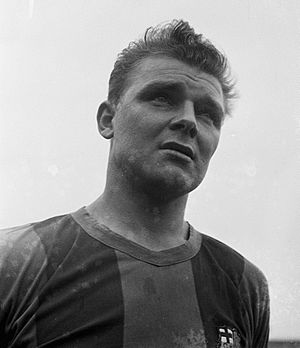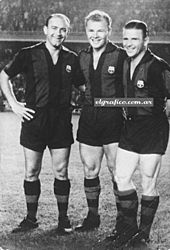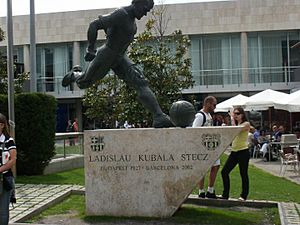László Kubala facts for kids

Kubala with FC Barcelona in 1953
|
|||
| Personal information | |||
|---|---|---|---|
| Full name | László Kubala | ||
| Date of birth | 10 June 1927 | ||
| Place of birth | Budapest, Hungary | ||
| Date of death | 17 May 2002 (aged 74) | ||
| Place of death | Barcelona, Spain | ||
| Height | 1.76 m (5 ft 9+1⁄2 in) | ||
| Position(s) | Striker | ||
| Youth career | |||
| 1939–1943 | Ganz TE | ||
| Senior career* | |||
| Years | Team | Apps | (Gls) |
| 1944 | Ganz TE | 9 | (2) |
| 1945–1946 | Ferencváros | 49 | (27) |
| 1946–1948 | Slovan Bratislava | 33 | (14) |
| 1948–1949 | Vasas | 20 | (10) |
| 1949–1950 | Pro Patria | 16 | (9) |
| 1950 | Hungária | 6 | (5) |
| 1951–1961 | Barcelona | 186 | (131) |
| 1963 | Toronto City | 25 | (18) |
| 1963–1965 | RCD Espanyol | 29 | (7) |
| 1966–1967 | Zürich | 12 | (7) |
| 1967 | Toronto Falcons | 19 | (5) |
| Total | 404 | (235) | |
| International career | |||
| 1946–1947 | Czechoslovakia | 6 | (4) |
| 1948 | Hungary | 3 | (0) |
| 1953–1961 | Spain | 19 | (11) |
| 1953–1965 | Europe XI | 2 | (3) |
| 1954–1963 | Catalonia | 4 | (4) |
| Managerial career | |||
| 1961–1963 | Barcelona | ||
| 1963–1966 | Espanyol | ||
| 1966–1967 | Zürich | ||
| 1968 | Toronto Falcons | ||
| 1968–1969 | Córdoba | ||
| 1969–1980 | Spain | ||
| 1980 | Barcelona | ||
| 1982–1986 | Al-Hilal | ||
| 1986 | Murcia | ||
| 1987–1988 | Málaga | ||
| 1988–1989 | Elche | ||
| 1992 | Spain Olympic | ||
| 1995 | Paraguay | ||
| *Club domestic league appearances and goals | |||
László Kubala (born June 10, 1927 – died May 17, 2002) was a famous Hungarian footballer. He also became a Spanish citizen. He played as a forward for many clubs, including Ferencváros, Slovan Bratislava, Barcelona, and Espanyol.
Many people think Kubala was one of the best players ever. He is seen as a hero at FC Barcelona. What makes him special is that he played for three different national teams: Hungary, Czechoslovakia, and Spain.
Kubala was known for his amazing dribbling skills. He could also score powerful goals and was very accurate with free kicks. In the 1950s, he was a key player for a very successful Barcelona team. He scored 280 goals in 345 games! In 1999, fans voted him the best player to ever play for the Spanish club. After he stopped playing, he coached Barcelona twice. He also coached Spain's main national team and their Olympic team.
Contents
Early Life and Football Journey
Growing Up and Starting Out
László Kubala was born in Budapest, Hungary. His parents came from different backgrounds. His mother, Anna Stecz, had Polish, Slovak, and Hungarian family roots. His father, Pál Kubala Kurjas, was a bricklayer from the Slovak community in Hungary. Kubala himself said he was a "cosmopolitan," meaning he felt at home in many cultures.
He started playing football as a junior for Ganz TE. This was a factory team in Hungary's third division. When he was just 11, he was already playing with older kids. At 18, he joined Ferencvárosi TC, where he played with another famous player, Sándor Kocsis. In 1946, Kubala moved to Czechoslovakia and joined ŠK Slovan Bratislava. He married Anna Viola Daučíkova, whose brother, Ferdinand Daučík, was the Czechoslovakian national coach. In 1948, Kubala went back to Hungary and joined Vasas SC.
Becoming a Refugee and Finding a New Home
In January 1949, Hungary was controlled by the Soviet Union. Kubala left the country hidden in a truck. He first went to Austria, then to Italy. There, he played briefly for Pro Patria. In May 1949, he almost played for Torino in a special game. But he didn't go because his son got sick. The plane carrying the Torino team crashed on its way back, killing everyone on board. Kubala was very lucky to have missed that flight.
Meanwhile, the Hungarian Football Federation said Kubala broke his contract. They also said he left the country without permission and didn't do military service. FIFA agreed and banned him from playing internationally for one year.
In 1950, Kubala and his brother-in-law, Ferdinand Daučík (who became his coach), formed their own team called Hungaria. This team was made up of other refugees from Eastern Europe. They came to Spain in the summer of 1950 to play friendly games. They played against teams like a Madrid XI and RCD Espanyol. They also played against the famous Millonarios FC team, which included Alfredo Di Stéfano.
Both Real Madrid and Josep Samitier, a scout for FC Barcelona, noticed Kubala during these games. Real Madrid offered him a contract. But Samitier convinced him to sign with Barcelona instead. Samitier used his connections to help Kubala get Spanish citizenship quickly. Kubala's escape to the West was even made into a successful film called The Stars Search for Peace. Kubala and Samitier played themselves in the movie!
Playing for FC Barcelona
Kubala officially joined FC Barcelona on June 15, 1950. As part of the deal, Ferdinand Daučík also became Barcelona's coach. Kubala's ban meant he couldn't play in La Liga until 1951. But he could play in friendly matches. In two games against Frankfurter S.V., he scored six goals and helped with five others! He also helped Barcelona win the Copa del Generalísimo (a cup competition) in 1951.

In his first La Liga season (1951–52), Kubala scored an amazing 26 goals in just 19 games. This included 7 goals in a 9–0 win against Sporting de Gijón. He also scored five goals against Celta de Vigo and three goals (a hat-trick) against Sevilla and Racing de Santander. His seven goals against Gijón are still the record for most goals in a single La Liga match! He also scored in the Copa del Generalísimo final, where Barcelona beat Valencia 4–2.
This season was one of Barcelona's best ever. Coach Daučík and Kubala, along with players like Velasco, Joan Segarra, and Ramallets, led the team to win five trophies! These included La Liga, the Copa del Generalísimo, the Latin Cup, and the Copa Eva Duarte.
Kubala got a serious illness called tuberculosis in the 1952–53 season. It almost ended his career. But he made an amazing recovery! He came back to help Barcelona win La Liga and the Copa del Generalísimo again. He scored in the Copa final win against Athletic Bilbao. During his time at Barcelona, he scored 14 hat-tricks in total.
In 1958, Kubala convinced two other Hungarian refugees, Sándor Kocsis and Zoltán Czibor, to join him at Barcelona. With a young Luis Suárez and Evaristo, they formed a strong team. They won La Liga and the Copa del Generalísimo in 1959. They also won La Liga and the Fairs Cup in 1960.
However, Kubala didn't play as much under coach Helenio Herrera. He missed the 1960 European Cup semi-final against Real Madrid, which Barcelona lost. After this, Herrera left, and Kubala was back in the team. In the 1961 European Cup, Barcelona became the first club to beat Real Madrid in that competition. Inspired by Kubala, they won and reached the final. They lost to Benfica 2–3.
Kubala stopped playing in 1961 and became a youth coach at Barcelona. Later, he coached the main team for the 1962–63 season. But he was let go after losing a Fairs Cup game. In 1963, he played for Toronto City in Canada.
International Football Career
László Kubala played for three different international teams! He played for Czechoslovakia, Hungary, and Spain.
While playing for ŠK Slovan Bratislava, he played six games and scored four goals for Czechoslovakia between 1946 and 1947. After returning to Budapest in 1948, he played three games for Hungary but didn't score. After becoming a Spanish citizen, Kubala played 19 times and scored 11 goals for Spain between 1953 and 1961. He was one of the few players born outside Spain to play for the country. A highlight was his hat-trick for Spain against Turkey in a 3–0 win in November 1957. Even though he played for three countries, Kubala never played in the final stages of a big international tournament like the World Cup. He was in Spain's squad for the 1962 World Cup but couldn't play due to an injury.
Besides playing for national teams, Kubala also played for a special Europe XI team and the Catalan XI. On October 21, 1953, England played a Europe XI at Wembley Stadium to celebrate the 90th anniversary of the Football Association. Kubala scored twice in that 4–4 draw. He also played four games and scored four times for the Catalan XI. In one game in 1955, he played with guest player Alfredo Di Stéfano. The Catalan XI won 6–2, with two goals from Kubala and one from Di Stéfano. Kubala even played for ten minutes in his own special farewell game in 1993, when he was 65 years old!
Coaching Career
After leaving Barcelona, Kubala became a player-coach for RCD Espanyol. There, he teamed up with Alfredo Di Stéfano. While at Espanyol, he gave his son, Branko, his first game in La Liga. In 1966, he joined FC Zürich in Switzerland, again as a player-coach. He played his last game in a European Cup match against Celtic.
In 1967, Kubala went to Canada to play for Toronto Falcons. It was a family reunion there, as his father-in-law, Ferdinand Daučík, his brother-in-law, Yanko Daucik, and his son Branko were also with the team. He played 19 matches for Toronto, scoring five goals.
By the end of 1968, he was back in La Liga. After a short time at Córdoba CF, he became the coach of the Spain national team. Kubala helped Spain qualify for the 1978 World Cup, ending their 11-year absence from the tournament. However, they didn't make it past the first group stage. He also managed them at Euro 80, where they were also knocked out early.
In 1980, he returned to Barcelona for a second short time as manager. Then he moved to Saudi Arabia to manage Al-Hilal. He later managed three more La Liga clubs. He led CD Málaga to win the Segunda División title in 1988. His last coaching job was with the Paraguay national team in 1995.
Career statistics
Club
| Club | Season | League | Cup | Continental | Total | |||||
|---|---|---|---|---|---|---|---|---|---|---|
| Division | Apps | Goals | Apps | Goals | Apps | Goals | Apps | Goals | ||
| Ganz TE | 1943–44 | Nemzeti Bajnokság II | 9 | 2 | 9 | 2 | ||||
| Ferencvárosi | 1944 | Nemzeti Bajnokság I | ||||||||
| 1945 | 22 | 19 | 22 | 19 | ||||||
| 1945–46 | 27 | 14 | 27 | 14 | ||||||
| Total | 49 | 33 | 49 | 33 | ||||||
| Slovan Bratislava | 1946–47 | Czechoslovak First League | 24 | 13 | 24 | 13 | ||||
| 1947–48 | 9 | 1 | 9 | 1 | ||||||
| Total | 33 | 14 | 33 | 14 | ||||||
| Vasas | 1948–49 | Nemzeti Bajnokság I | 20 | 10 | 20 | 10 | ||||
| 1949–50 | 12 | 6 | 12 | 6 | ||||||
| Total | 32 | 16 | 32 | 16 | ||||||
| Pro Patria | 1949–50 | Serie A | 16 | 9 | 16 | 9 | ||||
| Hungária | 1950–51 | 6 | 5 | 6 | 5 | |||||
| Barcelona | 1951–52 | La Liga | 19 | 26 | 19 | 26 | ||||
| 1952–53 | 11 | 7 | 11 | 7 | ||||||
| 1953–54 | 28 | 23 | 28 | 23 | ||||||
| 1954–55 | 19 | 14 | 19 | 14 | ||||||
| 1955–56 | 25 | 14 | 3 | 3 | 28 | 17 | ||||
| 1956–57 | 18 | 9 | 1 | 0 | 19 | 9 | ||||
| 1957–58 | 21 | 12 | 21 | 12 | ||||||
| 1958–59 | 20 | 9 | 5 | 3 | 25 | 12 | ||||
| 1959–60 | 12 | 7 | 3 | 6 | 15 | 13 | ||||
| 1960–61 | 13 | 10 | 9 | 1 | 22 | 11 | ||||
| Total | 186 | 131 | 1 | 0 | 20 | 13 | 207 | 144 | ||
| Toronto City | 1962 | ECPSL | ||||||||
| Espanyol | 1963–64 | La Liga | 29 | 7 | 29 | 7 | ||||
| Zürich | 1965–66 | Nationalliga A | 12 | 7 | 12 | 7 | ||||
| 1966–67 | 0 | 0 | 1 | 0 | 1 | 0 | ||||
| Total | 12 | 7 | 1 | 0 | 13 | 7 | ||||
| Toronto Falcons | 1967 | NPSL | 19 | 5 | 19 | 5 | ||||
| Career total | 391 | 229 | 1 | 0 | 21 | 13 | 413 | 242 | ||
International
| National team | Year | Apps | Goals |
|---|---|---|---|
| Czechoslovakia | 1946 | 1 | 0 |
| 1947 | 5 | 4 | |
| Total | 6 | 4 | |
| Hungary | 1948 | 3 | 0 |
| Total | 3 | 0 | |
| Spain | 1953 | 3 | 1 |
| 1954 | 1 | 0 | |
| 1955 | 2 | 0 | |
| 1956 | 4 | 4 | |
| 1957 | 2 | 4 | |
| 1958 | 3 | 2 | |
| 1959 | 3 | 0 | |
| 1960 | 0 | 0 | |
| 1961 | 1 | 0 | |
| Total | 19 | 11 | |
| Career total | 28 | 15 | |
Honours
Player
Barcelona
- La Liga: 1951–52, 1952–53, 1958–59, 1959–60
- Copa del Generalísimo: 1951, 1952, 1953, 1957, 1959
- Inter-Cities Fairs Cup: 1955–58, 1958–60
- Latin Cup: 1952
- Copa Eva Duarte: 1952, 1953
Individual
- Ballon d'Or: fifth place 1957
Manager
Málaga
- Segunda División: 1987–88
See also
 In Spanish: Ladislao Kubala para niños
In Spanish: Ladislao Kubala para niños
 | Jackie Robinson |
 | Jack Johnson |
 | Althea Gibson |
 | Arthur Ashe |
 | Muhammad Ali |


